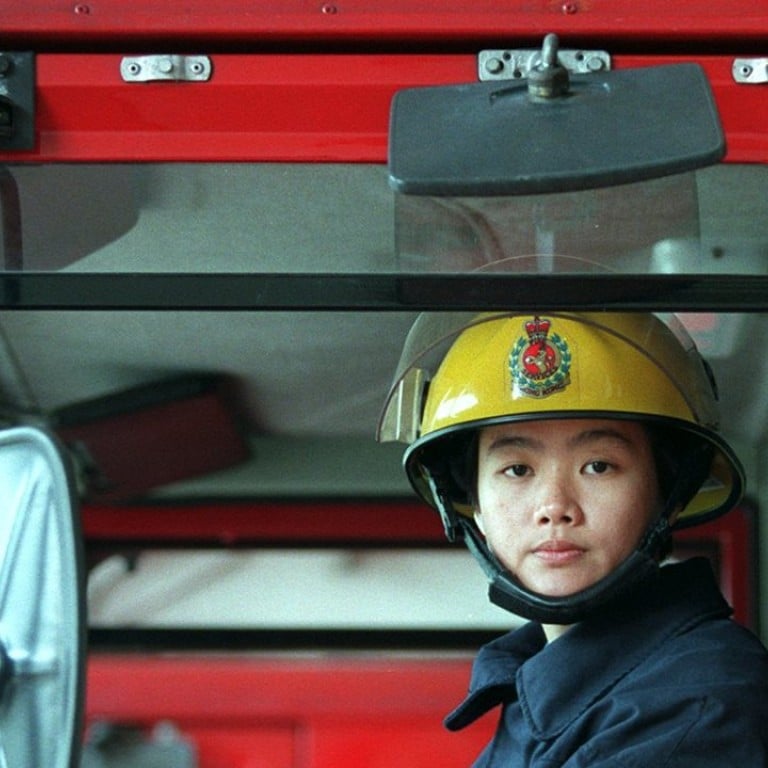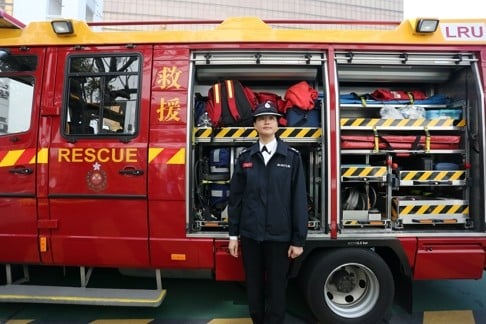
Woman in a man’s world: Hong Kong’s top female firefighter, Anna Wu
23-year veteran and one of only 11 women fighting fires in the city initially signed up to challenge herself. As she counsels youngsters in her spare time, your sex doesn’t matter if you have the heart and ability for the job
When she puts on a firefighter’s bulky protective clothing and helmet, Anna Wu Lai-fong is often mistaken for a man. It’s not until she takes off her mask or speaks that people realise she’s a woman.
Wu is a rare woman in a male-dominated field. A divisional officer in Hong Kong’s Fire Services Department, she saw action at the devastating 1996 Garley Building fire and now oversees four fire stations with some 300 firefighters under her command, all of them men.
Watch: Meet Madam Wu, one of Hong Kong’s first female firefighters
There are just 10 other women among the department’s 6,250 firefighters. At 46, Wu is the highest-ranking woman firefighter – and an inspiration for others eager to break through gender stereotypes.
She signed up when the department went on a recruitment drive in 1993 in response to a manpower shortage. Their newspaper ad quickly caught her eye. She recalls it read: “For the first time in our 125 years’ history, we are recruiting females to join the Fire Services Department. Do you dare accept the challenge?”

An athletic sort, she had been part of the Hong Kong basketball team and had worked as a physical education teacher in a secondary school. The ad intrigued her, as firefighting was widely regarded as a man’s job.
“I didn’t expect to make it through but wanted to challenge myself. I treated it like a game, I wanted to see what level I could reach before being kicked out,” Wu says.
As it turned out, she was one of only two women candidates who passed the department’s rigorous fitness tests to qualify that year.

During their 26 weeks of training, she and the other successful female candidate, Kwok Lai-shan, weren’t treated any differently to the others, Wu says. Like the male candidates they must be able to go up ladders in under a minute while carrying an 18kg oxygen cylinder, and they have to drag heavy fire hoses 23 metres within 11 seconds.
“The requirement to be a firefighter is the same, no matter if you’re a man or woman. They can’t give you mini-sized equipment to fight fires just because you’re female,” says Wu.
The Fire Services Department is the only disciplined service in Hong Kong to set the same fitness standards for men and women. Others, such as the police force and correctional services, either set a range or have different standards for the two sexes.
Firefighters must meet such tough physical standards to be able to work effectively and rescue people in hazardous environments – they may be carrying 30kg of protective gear and equipment on their backs, in some cases almost half their weight, Wu says.
During training she and Kwok teamed up and worked extra hard because they knew women were physically at a disadvantage to men.
“Whenever we felt sleepy while studying for our weekly tests, we’d get up and just do press-ups, chin-ups or sit-ups,” Wu recalls, laughing at the memory.

“Normally, people are evacuated from a dangerous place to safety, but for us it’s the opposite – firefighters have to go from a place of safety into danger,” she says of the job.
Among the defining moments of her career was tackling the Garley Building fire in Yau Ma Tei, which killed 41 people and injured 80 others two decades ago.
She was a station officer at the time, and her crew was assigned to clear one of the 16 floors, putting out any remaining flames and searching the rubble for trapped bodies.
It was dark when they entered the smoke-filled hallways of the building. The torches strapped to their belts did little to illuminate their pitch-dark surroundings. Wu recalls there being little noise other than the sound of their own breathing through the oxygen tanks as they began their 16-hour search.
“Before going in, we heard the news that one of our colleagues had died in the fire. Our hearts were very heavy. I was leading a team of four, and I remember telling them, no matter what happens, we all have to stick together; we are not going to lose a single person,” she says.
In the face of adversity, it’s important to have a positive mentality and be able to remain strong, she says. “It was one of the most frustrating times because we already knew that so many people had died, and we weren’t going in to rescue anyone,” Wu says.
Her team scoured their assigned floor to clear the pathways and make sure that embers would not reignite. As daylight broke, sunlight filtered through the blackened windows and made it a little easier to sort through the debris. By the time the team finished, everyone’s shoulders and backs were bruised from the numerous times they had to switch to new oxygen tanks.
“It’s a very contradictory feeling. You keep telling yourself you don’t want to find any bodies, but you also need to make sure that no bodies are left unfound,” Wu says.

The mission also gave her family many anxious moments.
“My mum was very supportive [of my firefighting]. She knew I was very independent growing up and had confidence in me. It wasn’t until the Garley Building fire that she broke down; she couldn’t stop crying and hugging me after I came home. They say they’re not worried, but you know in their hearts they are,” Wu says.
“In fact it was my friends who had more doubts about [the job], because no one had ever done it before and nobody was able to give me advice. So they foresaw a lot of obstacles if I was the first female firefighter.”
Once the uniform is on, we’re transformed into firefighters; there is no male or female ... I think it’s really about whether you have the right personality for the job
She has overcome those hurdles to win the respect of other firefighters - colleagues such as Lee Kai-leung, 42, who describes her as a commander who is “easy-going, but never fails to uphold integrity”.
“It’s not easy to get to where Madam Wu is today, and even more so as a woman.”
Wu is the first woman commander that veteran firefighter Lung Ching-chee has worked with since he joined the department 36 years ago.
“It’s very refreshing and new,” says the 54-year-old, who is retiring in a few months. Working with her is no different but after a shift, they take care to speak and act more politely in the presence of a lady, he adds.
The Fire Service Department does not set a quota for recruiting women, unlike other metropolitan fire brigades, such as those in Canberra and Tokyo, which seek to improve the gender balance in their workforce. Women make up just 0.18 per cent of firefighters in Hong Kong compared with about 6.5 per cent in the London Fire Brigade, which employs about 6,000 firefighters.
A spokesman for the department said: “It is the aim of the [Fire Services Department] as well as the government to appoint the best person for the job.”

Although Hong Kong has a lower proportion of woman firefighters than other city fire departments, Wu says the focus should always be on individual merit rather than sex.
“Once the uniform is on, we’re transformed into firefighters; there is no male or female ... I think it’s really about whether you have the right personality for the job.
“You have to be very tough and be able to stay positive. We always say we have to work in a 3D environment – difficulty, danger and dirty.”
She is still single but says other woman firefighters have married and had children – they just have to train harder to stay in top form after pregnancy.
Wu, who mentors and counsels young people when she’s off duty, offers the advice she often gives her young charges: “It doesn’t matter if you’re a man or a woman if you have the ability, the heart to serve.”
She adds: “It’s a job that I feel can really directly help people and gives great satisfaction.”

